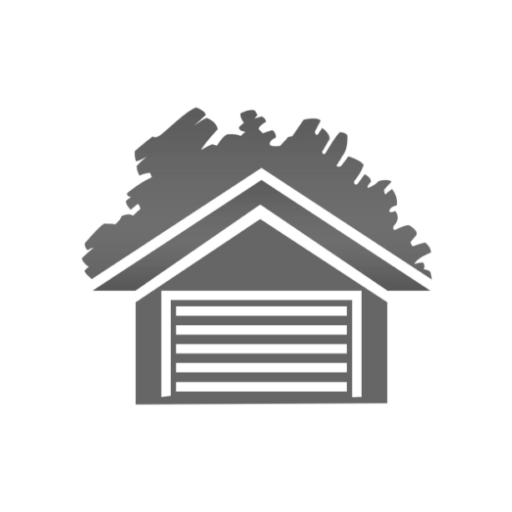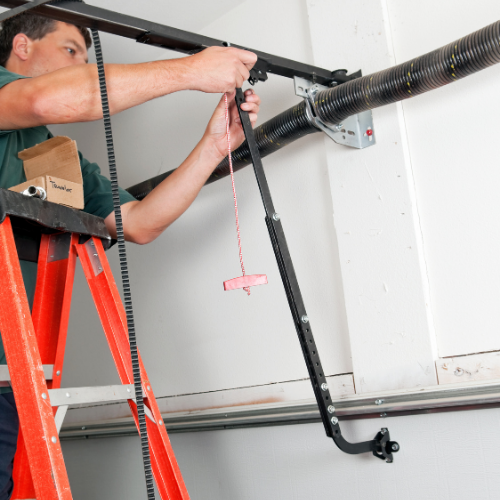You have two main types of springs that garage doors use to open and close: torsion springs and extension springs. The springs lift the garage door up and down. You may wonder about the differences, and we decided to answer this question because this question pops up a lot.
What are Extension Springs?
An extension spring will expand and contract with the garage door. You install multiple components with this spring, such as hardware and safety cables. The technician installs the springs on both sides of the door to hold up the door’s weight on each side.
Coordinating with a pulley system, the garage door opens and closes. One extension spring costs $30. Hiring a technician costs between $100 to $120 to replace one extension spring.
It costs $130 to $150 to replace both springs. An extension spring has the advantage of lower cost. A torsion spring, in comparison, will cost $75 to $150 per spring.
Important to note with either spring, don’t try to save money by installing this yourself.
People have been maimed and killed, especially with the extension spring. You need experts who understand how to work on the springs of your garage door safely.
Torsion Springs
A torsion springs, on the other hand, differs in that it exerts a torque force. The springs have a helical design that twists and rotates. This spring will either work in the clockwise or counterclockwise direction. Because a torsion spring turns, it has a longer lifespan.
Extension spring will last between seven to nine years. A torsion springs lasts seven to 12 years. You don’t need as many components with a torsion spring.
Safety: Which One Wins?
A torsion spring has a much better safety record, but you still shouldn’t install it by yourself. Call Cherry Hill Garage Door, a garage door company in Cherry Hill, New Jersey, to safely install your springs.
The torsion spring offers greater safety because it has backing on it. While the torsion spring can break, it remains firmly in place.
An extension spring breaking will always be a traumatic experience. You don’t want to be anywhere near the garage when it breaks. The spring has ripped right through drywall and killed people in the next room.
When they break, they will damage anything in the vicinity, including vehicles and possession as it cannons across the garage. A torsion spring will make a loud noise when it breaks, but you won’t suffer harm as long as you weren’t working on it. You still shouldn’t install a torsion spring yourself.
In contrast, they use safety cables on an extension spring to protect everyone in the vicinity. They have fallen out of favor because of the safety issues.
Functionality: The Superior Choice
An extension spring can move at an erratic pace, but they stay in balance and open steadily. A torsion spring works best for applications where you only have a limited amount of space to work with because it lowers the hardware. The spring rate from a torsion spring remains consistent through its operation.
Usually, they construct this spring from titanium, stainless steel, carbon or beryllium copper. The material determines how much energy it stores. The spring chosen must have the right size, or the door will either be too heavy or too light. A torsion spring lowers and raises the garage door in a more controlled manner.
Why the Extension Spring Remains Popular
The prohibitive cost of the torsion spring stops it from taking over altogether. You pay much more for the torsion springs over the extension spring.
Extension does the job, but it doesn’t have as many benefits. Buying a torsion spring does usually mean that it lasts longer, which gives you your money’s worth. Still, people choose the extension springs because it costs less.
Lifetime
We talked about how torsion springs last anywhere from seven to 12 years, which makes them longer lasting. We didn’t talk about the cycles for each.
Torsion spring gets anywhere from 15,000 to 30,000 cycles. An extension spring, in contrast, will last 10,000 cycles. You have one unforeseen advantage that we’d like to highlight with the torsion spring. Because it performs with better balance, the motor never overtaxes itself.
This extends the lifetime of your garage door opener as a whole because the internal components don’t have to deal with as much daily pressure as with an extension spring.
What Should You Choose
If you have limited space, the torsion spring makes for a better choice. Anyone who wants a longer-lasting spring will choose the torsion spring.
The torsion spring remains the superior choice except for the one thing that makes it less desirable: cost. You will pay more for a torsion spring, and if you have a tight budget, then we’d advise you to choose the extension spring.
You may want to keep these things in mind when you go to buy garage door springs. We can highlight the differences for you in person, but this makes you know what you want right away.
Usually, you want to replace the garage door spring before it gets so old that it snaps. Whether a torsion spring or an extension spring, it scares the average person. Hiring a technician to install this makes a difference because we have the know how and equipment to install the springs safely without injury.

